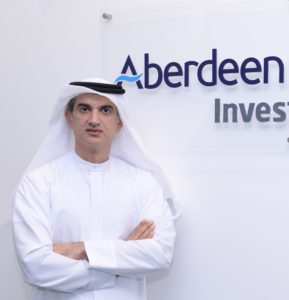Cautious Optimism Advised In Post-Pandemic Investment World
As the global economy continues to recover from the COVID-19 pandemic, Aberdeen Standard Investments (ASI) is advising MENA based investors to be optimistic, but also cautious, in the second half of the year.
Investment experts at Aberdeen Standard Investments, who have been supporting their clients through the COVID pandemic, say the most common question is – what is their latest economic thinking and outlook for the recovery and what is their outlook for the major asset classes?
Investors also want expert opinion on what permanent changes they can expect to come about post Covid-19 and what impact will these have on countries, sectors and industries.
Working with a global research team Edris Alrafi, Head of Middle East & Africa for Aberdeen Standard investments (ASI) has provided some guidance to clients in MENA.
Regarding the outlook for economic recovery, he said: “For all its size, the contraction phase of the crisis has been short-lived, with the earlier than anticipated widespread easing of lockdowns implying that a global recovery began in May.
“While some of this may merely be a function of the mathematics and the reversal of such an unprecedented slowdown, we are of the view that strong macro momentum readings would give the risk rally further impetus. The market reaction to the much better than expected May payrolls data supports that contention.
“This said, rapidly improving economic data in the near-term should not blind us to the fact that the long-term consequences of the crisis are also likely to be profound. Negative drivers for economic growth and market returns include higher precautionary savings and lower investment rates, persistent scarring of labour markets, an increase in the proportion of zombie firms and populist political pressures leading to more growth unfriendly domestic and international policies and regulations.
“More positive drivers include the potential for acceleration of digital innovation, diffusion and commercialisation, reinvigoration of the contract between corporations and society and an expanded role for fiscal policy amid greater coordination with central banks. On balance though we expect the negative drivers to outweigh the positive, with the crisis leading to a permanent loss of output relative to the pre-crisis trend, further disinflation and lower equilibrium interest rates.
“There are undoubtedly reasons to be nervous with markets at these levels. However, with an economic recovery underway and with risk-free rates anchored at 1% or lower, valuations are fair, albeit with considerable uncertainly around them.Much of the return from here is likelycome from more granular views – sector and stock – than the pure top-down views.”
The next most common question investors are asking ASI is what changes investors can expect to see in the post-Covid-19 world.
Edris responded: “The enormous economic shock resulting from the pandemic will exacerbate or accelerate existing problems and imbalances facing many companies and countries. One conclusion is that an even more granular approach will be required choosing between winners and losers. Similarly, “quality” and “resilience” are likely to become even more important investment themes, especially against the backdrop of an unprecedentedly large profits recession and rising defaults.
“Interest rates and short dated bond yields will remain low for the foreseeable future, partly due to wider output gaps / spare capacity and partly due to central bank actions to manage large government deficits and debt levels. Hence sustainable yield from IG debt, selected global equity and selected real estate will become even more attractive.
“While the impact of the virus on the global economy is huge, it is also increasingly clear that the trough for the global economy was seen in April. Permanent damage has been done to the global economy, but notwithstanding this, we are about to enter a period with improving economic data. Risk assets are by no means “cheap”, but with a recovery in place and with a low risk-free rate, it is reasonable to expect positive returns from here – albeit with considerable uncertainty around them.
“Many business models will need to adapt rapidly to the new economic order. Companies receiving direct and indirect support from the state and central banks can expect to see much more government oversight, whether directly through share holdings and guaranteed loans or indirectly via regulation.”
ASI believes that while the coronavirus and its impacts is naturally dominating thinking, fund managers should not neglect the importance of other drivers, positive and negative, such as climate change, 5G and long standing demographic trends.
Edris continued: “The technology sector has been a driver across developed and emerging markets. There have been three waves of major technology advances – internet, mobile and cloud. Successful companies have leveraged these open platforms to create franchises of significant scale, primarily through software investment. This technology shift has led to new business models with established competitive advantages and in some cases dominant market positions.
“Finally, it’s important for us to pay more attention to finance ministers than to central bank governors going forward as the relationship between fiscal and monetary policy making has likely changed permanently.”







